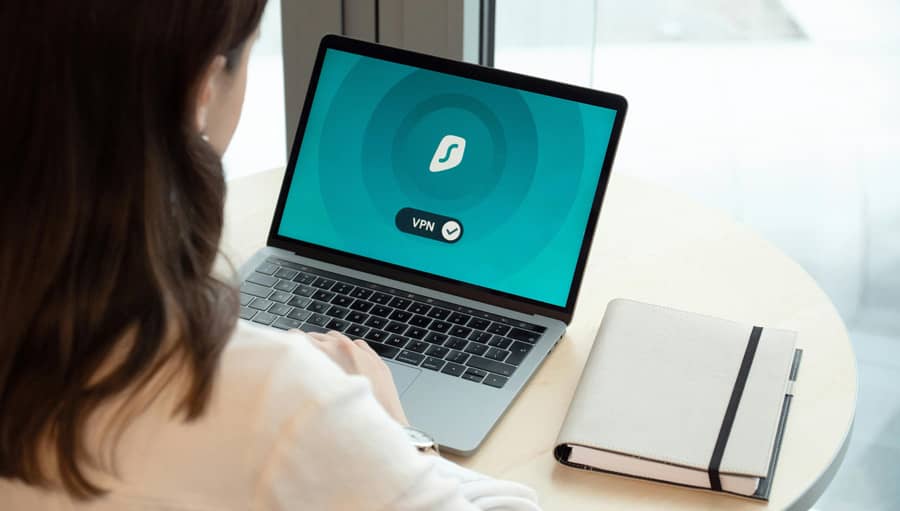Running an online business has limitless potential, but there are also a lot of cybersecurity risks involved.
You’re handling customer data, managing remote teams, and all your finances are handled online. Getting hacked or having your data stolen can very well mean the end of your business.
The good news?
One simple tool can help protect your business: a virtual private network, or VPN.
Read on to know what a VPN is and how it can protect your business in 5 key ways.
Table of Contents
What Is a VPN?
A VPN (Virtual Private Network) is a program that encrypts your internet connection by routing it through different servers.
Instead of your internet activity going straight to and from your device, it will pass through the servers of the VPN provider. These servers are ultra-secure and can also be based in different geographical regions across the world.
This hides your IP address, effectively masking your online activities from hackers, your internet service provider (ISP), and even business competitors.
You can then remain private, protect your data, and access the internet more freely and securely—all of which are non-negotiables when running a successful online business.
1. Safeguards Business Data and Communications
The data your business sends or receives online (invoices, contracts, customer info) is valuable—and vulnerable.
Hackers routinely target smaller businesses precisely because of their valuable data and because they don’t implement strong cybersecurity practices.
Studies show that 43% of all cyberattacks target smaller businesses—and businesses lose anywhere from $120,000 to $1.24 million as a result. For businesses of such size, this is practically a death sentence.
After all, if your password gets stolen, if your website gets crippled, or if trade secrets get leaked, you lose a lot of money in the aftermath.
A VPN encrypts your whole internet connection, providing an extra layer of protection from cybercriminals. Your passwords, emails, websites, financial information, project management tools—everything you do on the internet will remain private with a VPN.
2. Enables Safe Access for Remote Teams
In the era of remote work, online businesses usually employ remote workers, freelancers, and collaborators from different parts of the world. While this flexibility is great, it’s also a security risk.
Remote workers and digital nomads, after all, often work in places like coffee shops, where they use public Wi-Fi. The problem with public Wi-Fi is that, technically speaking, everyone connected to it can see what everyone else is doing with the connection.
Without a VPN, all the data they’re accessing and transmitting goes straight from their device to the Wi-Fi connection and is out in the open for everyone to access.
It’s wise to require all remote workers to use a VPN when accessing business data, sites, and software on public Wi-Fi.
There are also VPNs for mobile devices so they can safely access business data on their phones. Click here for a VPN APK download for Android.
3. Reduces the Risk of ISP Throttling
Some ISPs intentionally slow down your connection when they detect you’re using a lot of bandwidth. This nasty tactic is called “throttling.”
Businesses regularly hold video meetings and upload and download large files—which indeed uses a lot of bandwidth.
A VPN hides your online activity from your ISP, and they’ll have no justification to limit your speeds. (Not like they should in any case—you’re paying full price for your internet, after all!)
This results in a faster, more stable internet connection, allowing you to stay as productive as possible and ensuring the best customer experience.
4. Improves Access to Geo-Restricted Tools and Markets
VPNs don’t just protect—they also empower. Certain websites, tools, or platforms are geo-restricted. With a VPN, however, you can change your digital location. Simply choose a server whose location you need, and there you have it.
What does this allow you to do?
-
- You can test your site from different regional perspectives.
- You can use location-specific services.
- You can access local deals in different countries.
- You can conduct market research by browsing local sites.
- You can reach customers in places with internet censorship.
If your business operates internationally (or plans to), use a VPN to go truly global.
5. Builds Customer Trust Through Proactive Privacy
Customers expect you to take their data privacy seriously—and rightfully so. After all, they’re giving you sensitive details when they make a purchase (card details, address, phone numbers, etc.).
If your business’s data gets breached, your customers’ data gets breached too. You’ll lose all trust and confidence from your customers.
In fact, just knowing that you don’t take cybersecurity precautions is enough to turn many customers off, even if you haven’t breached yet.
Of course, using VPNs is just a part of it. Make sure you use SSL certificates, secure payment gateways, and clear data policies for a holistic approach to cybersecurity.
Final Thoughts
Getting your data stolen can spell extreme financial loss, if not the very end of your business. But protecting it isn’t difficult. A VPN is easy enough to use, even for laypeople.
With a VPN, you can ensure your business data remains private, browse the internet more freely, and assure your customers.
In doing so, you’re in a far better spot to reach your business’s maximum potential.
